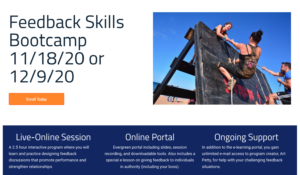Part 1 in this series focused on Why We Don’t Like the Idea of Giving or Receiving Feedback
Part 2 offered Seven Actions to Help You Succeed with Feedback
In Part 3 of this series, the emphasis is on managing the discussions successfully with empathy and clarity. It turns out when the feedback discussion goes off the rails, as happens all too often, it’s because empathy and clarity were nowhere to be found.
Focus First on the Needs of the Feedback Receiver
As challenging as it is for even the best-trained and experienced givers of feedback to conduct constructive feedback discussions, the emotional burden is borne by the person receiving the input.
Receiving constructive feedback fires up a full shopping cart of emotional reactions ranging from challenging a person’s sense-of-self to generating feelings of outrage, anger, or disappointment.
As the feedback giver, it’s imperative for you to tune-in to the potential for these emotional reactions and bring both empathy and clarity to the situation. Your extra work preparing for the discussion will improve your odds of creating a mutually valuable outcome.
First, Earn the Right to Give Someone Feedback
The quality of your feedback discussions are directly related to the quality of the relationships you foster with your team members. Research shows trusting, engaged leaders generate a positive brain response from their counterparts, while dissonant or negative leaders achieve the opposite.
Invest in creating quality relationships where the understanding and expectation is you will help each other with feedback. The belief that you have the person’s safety and growth at the forefront of your mind opens the door to excellent quality feedback exchanges.
Just remember, you have to earn the right to give someone feedback. If your first effort at relationship development and creating trust is in the feedback discussion, you’re in for a challenging experience.
Always Pre-Plan Your Opening Sentence(s) to Ensure Clarity
I’m on record a few thousand times, indicating that the feedback giver’s opening sentence(s) determines the discussion’s fate. That’s a lot of weight for a sentence or two, but the openers are where you frame the discussion around the observed behavior and tie it to impact.
While some models suggest the impact should focus on how it affected you, I advocate for focusing on how the observed behavior impacted business performance. Connecting the behavior to performance reduces the odds of it feeling like an indictment.
Once you’ve crafted the opening sentence, practice delivering it until you are comfortable with the sound and flow.
Tune Your Attitude Before You Engage
I strive to remind myself ahead of a feedback discussion on how important this opportunity is for both of us. I remind myself to tune my mind, voice, and body language to show care, encouragement, and openness. Importantly, instead of dictating a change, I remind myself that it’s incumbent upon me to facilitate the mutual development of an approach.
Once my attitude is appropriately adjusted, I select a location that is neutral and private. If it’s a conference room, I strive to not sit in the power seat. I never ask people to my office—I go to their location or a neutral site.
Finally, Engage with Empathy, Humility, and Clarity
I know from long history and ample feedback I tend to come across strong in my communications. It’s essential for me to think through how I’m going to engage. You should do the same. Armed with the pre-preparation for your opening sentence and the right attitude, vocal tone, and body language, you can comfortably engage in the discussion to pursue mutual gain. If you are uncomfortable with the behavior and topic, don’t hide it.
Our tendency with challenging conversations is to hurry up and escape. Do the opposite. Slow down. Let the receiver process the situation. Encourage suggestions immediately, and importantly, shift the focus to the future. Start talking about how the behavior might look in future settings. Once you agree, offer coaching, set a follow-on time to review progress, and thank the individual.
The Bottom-Line for Now:
Because feedback can trigger so many adverse emotional reactions, extra care is essential in planning and conducting these discussions. Your extraordinary work to focus on the receiver’s needs in feedback discussions will improve your odds of successful outcomes and strengthen your relationships all at the same time.
—
Professional Development Opportunity
For any individual interested in moving from good to great with feedback, join me for a few hours on 11/18/20 or 12/9/20 (you pick one) for our Feedback Skills Bootcamp. You’ll leave with a clear understanding of how to design and manage feedback discussions for success. You also gain a treasure trove of supporting materials to help reinforce the lessons from the Bootcamp. If you are reading this after the dates above, drop me a note and I’ll share the timing on upcoming sessions.








Leave A Comment